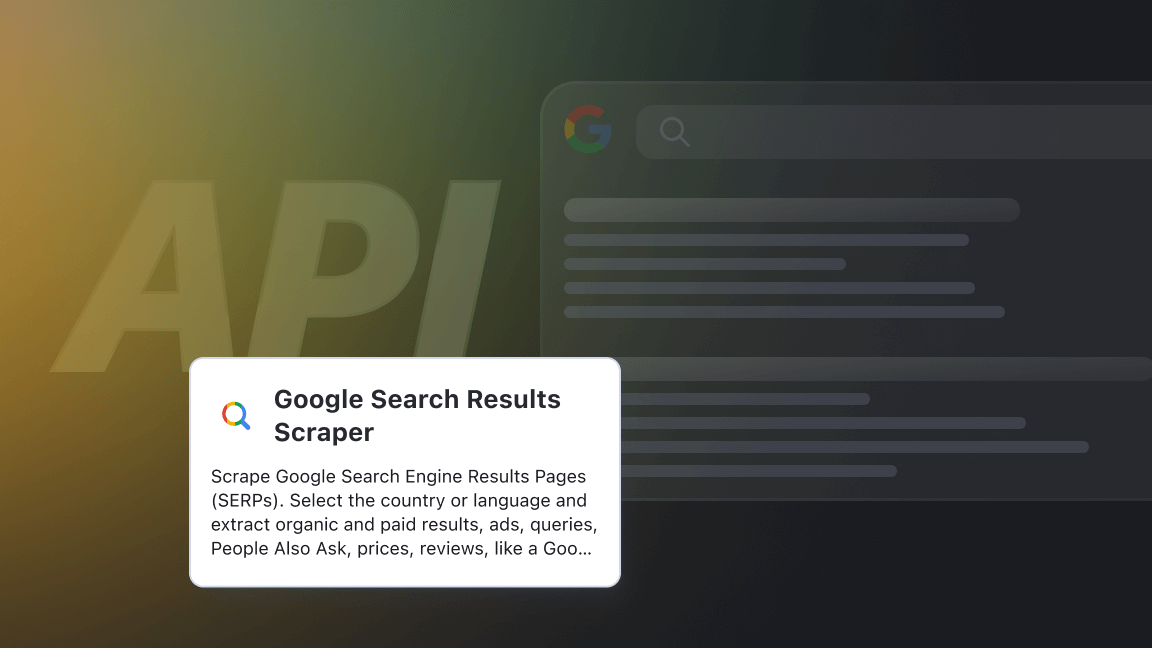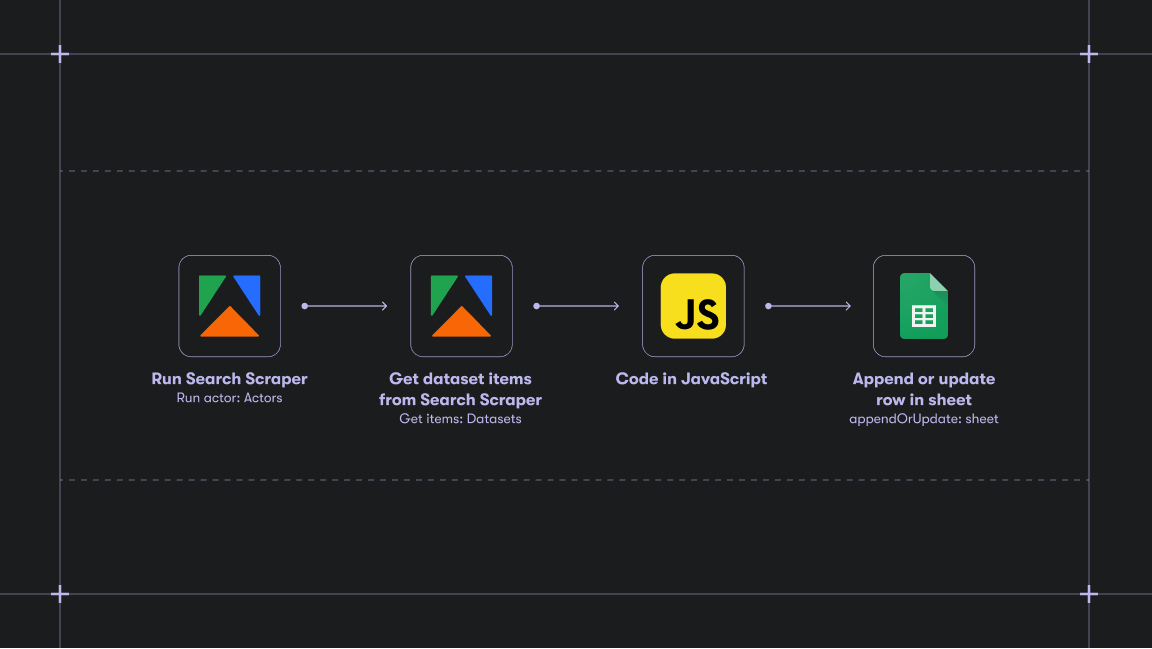If you’re a developer building APIs, finding the right marketplace for your solutions can make or break your success. The right platform doesn’t just list your API - it boosts your visibility, increases your monetization potential, and handles billing, analytics, and authentication for you. It also determines how much time you spend maintaining infrastructure instead of building.
With the right marketplace, you can reach thousands of active developers and businesses. Without one, your API may stay buried or too complex for anyone to use.
We’ll look at five API marketplaces that help developers publish, monetize, and scale their APIs effectively: Apify, APILayer, Zyla API Hub, RapidAPI, and Postman API Network.
Best API marketplaces - quick comparison
Not all marketplaces are built the same - some offer extensive testing features, others focus on quality assurance or billing:
| Platform | Monetization options | Analytics | Best for |
|---|---|---|---|
| Apify | By publishing scrapers on Apify Store | Usage logs, run history, performance metrics | Developers and consumers who need both ready-made tools and custom scraping infrastructure |
| APILayer | For curated APIs only | Usage monitoring, quota tracking, error monitoring | Consumers who want stable, high-quality data APIs with transparent pricing |
| Zyla API Hub | Open publishing | Subscription usage tracking, API call metrics, conversion analytics | API providers who want to monetize, and consumers seeking a wide range of APIs |
| RapidAPI | Open publishing | Basic metrics: usage, errors, latency | Developers wanting the largest public API marketplace with monetization options |
| Postman Public API Network | No monetization, exposure only | Request/test results, response times, limited analytics | API consumers who want to discover and test APIs quickly via Postman |
The real differences become clear when you look at each platform individually.
1. Apify
Apify is a platform for web scraping and automation that lets developers turn any website into an API. Developers can build their own scrapers and data APIs in Apify Console using templates or custom code, and monetize them through Apify Store - a marketplace of 9,000+ ready-made scrapers. Consumers can browse scrapers by category, service type, or author and run them instantly.
The platform provides an open-source SDK, cloud runtime with scheduling, scaling, and monitoring. Scrapers automatically expose a ready-to-call API endpoint with JSON, CSV, or Excel output.

Key features:
- Marketplace offering scrapers and automation tools standardized as Apify Actors
- Auto-generated user interface based on the input schema for each Actor so that non-coders can tweak input easily (using keywords, URLs, or filters)
- Infrastructure is provided - you deploy scrapers to Apify’s cloud without the need to host your own servers
- Proxy rotation, anti-blocking logic, and session management to help reduce IP blocking or detection
- Monitoring console with run status, granular metrics (with detailed logs and error classifications), as well as alerts set in Console, via email or Slack
- You can schedule Actors or tasks to run automatically and set up integrations with third-party apps for easy data flow
- Built-in monetization with various pricing models e.g. pay per event and subscriptions.
Limitations:
- Apify Store is scraper-focused. APIs outside scraping and web automation could be outside Apify’s core domain
2. APILayer
APILayer offers a curated marketplace focused on utility and data APIs - geolocation, currency conversion, email validation, IP lookup, and similar. The catalog is domain-specific and intentionally limited, with every API manually reviewed for quality, uptime, and reliability before being published.
APILayer supports a community of over 450,000 developers, offering workshops, tutorials, and code examples to help users build real-world projects.
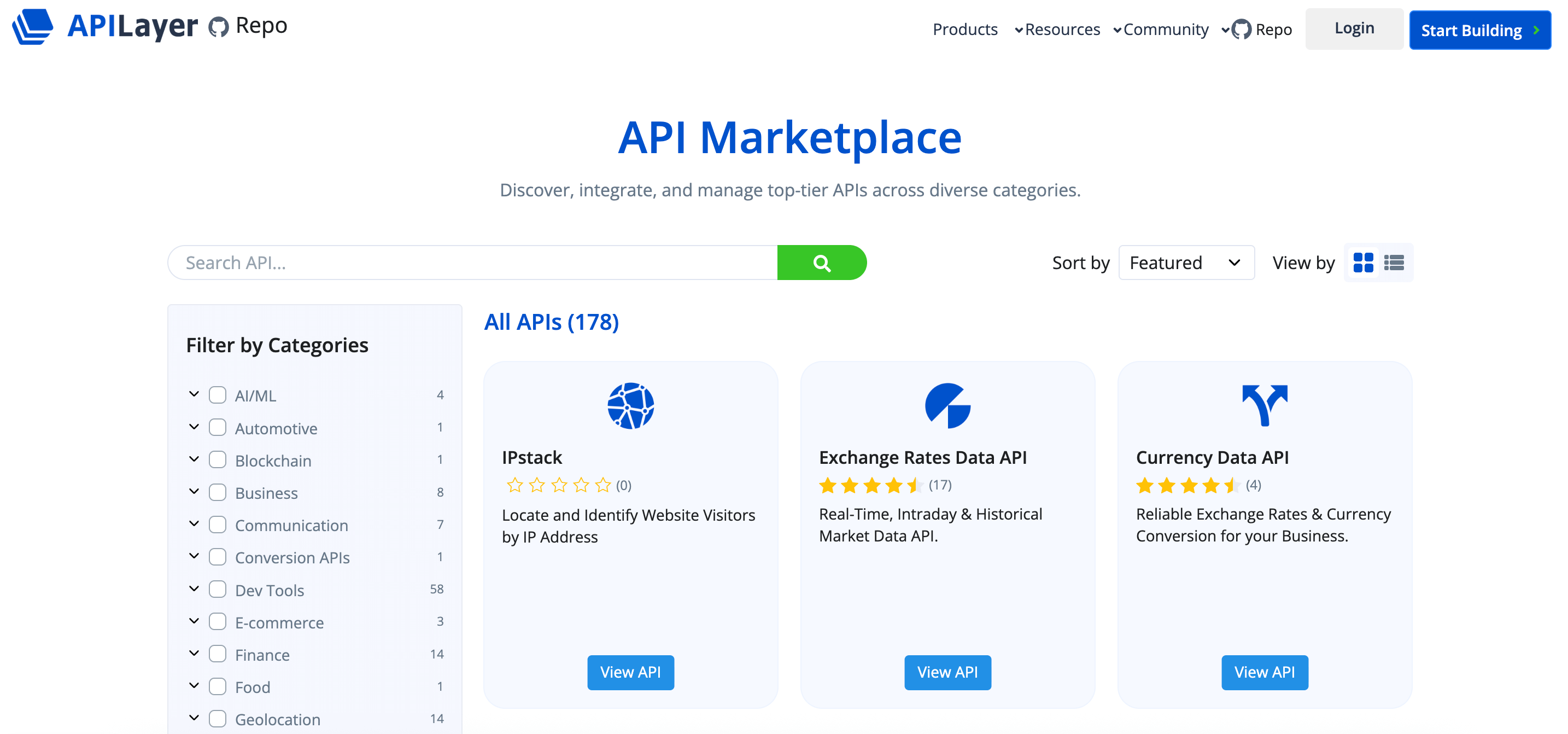
Key features:
- Focused catalog of curated utility/data APIs - less noise and fewer low-quality or abandoned projects
- Subscription per API, with predictable pricing per volume of requests, making budgeting easier
- Centralized developer dashboard for usage, quotas, and API keys
- SDKs and docs provided for every API for faster shipping
- Developers can list their APIs, set pricing, and manage usage through Zyla infrastructure
Limitations:
- Narrower coverage and lower discoverability: if your API is niche or beyond the utility/data scope, you may not find a match
- Less advanced governance compared to full API management platforms - providers can’t configure per-endpoint rate limits or IP whitelisting/blacklisting
3. Zyla API Hub
Zyla API Hub offers a public marketplace with 4,000+ APIs across a wide range of categories, but unlike open marketplaces, Zyla applies a vetting process to ensure minimum uptime and reliability standards. The platform includes built-in monetization, subscription management, usage tracking, and open publishing tools for API providers, making it a good option for developers who want visibility without sacrificing quality control.
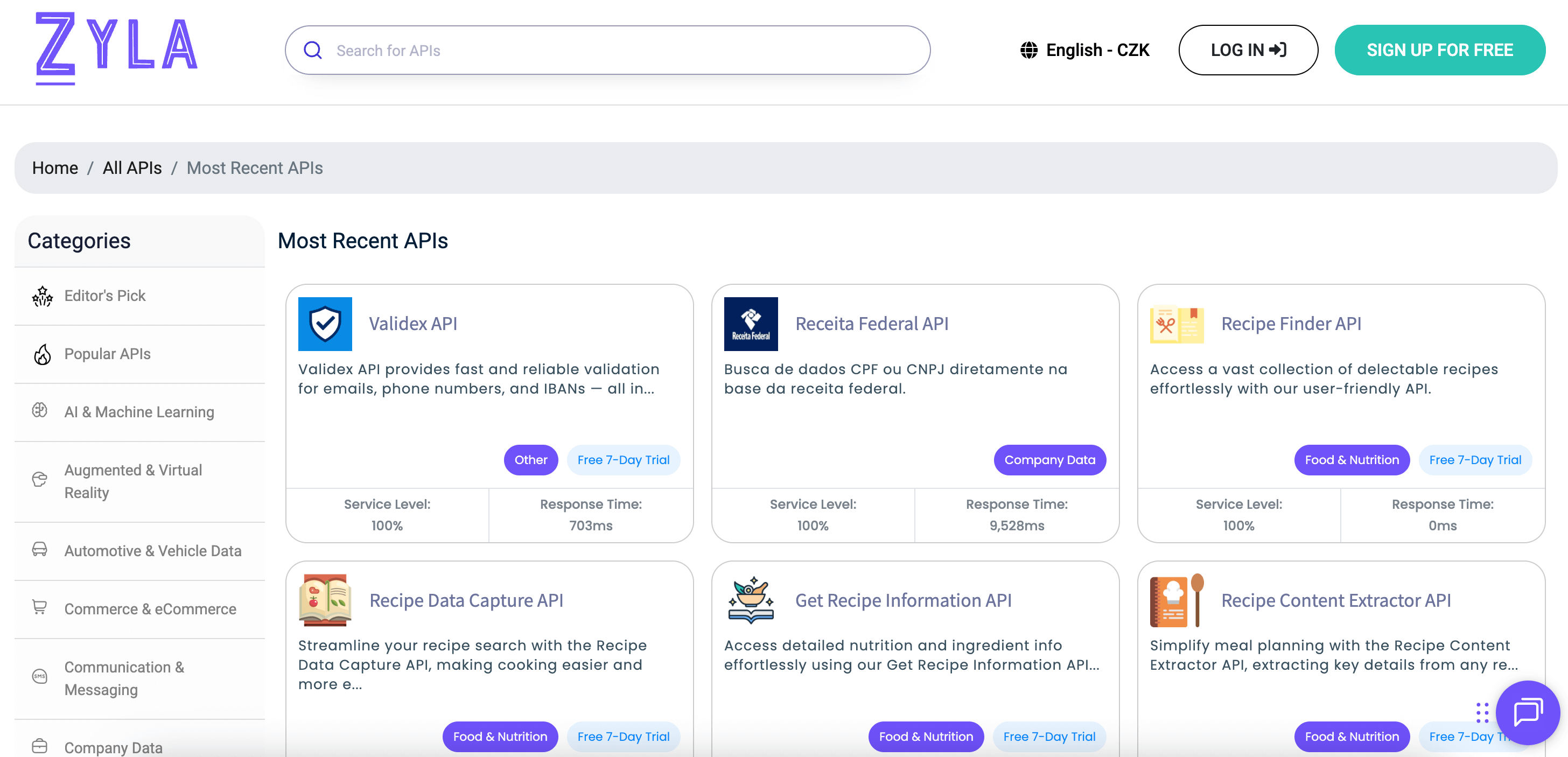
Key features:
- Marketplace offering API listing, subscription, developer portal, and key management
- Filtering for consumers for easier discovery - by category or tags
- Focus on quality: Zyla enforces a minimum uptime requirement (e.g. 99.8%) for listed APIs. If it falls below that, the creator’s earnings may be reduced or the API may be suspended
- Built-in testing console
Limitations:
- APIs in niche domains may have limited reach
- Providers don’t get full control over modifications: changes to endpoints or response formats must be reviewed by Zyla’s quality-control team and could impact subscribers
- Zyla takes ~20% revenue share from providers
4. RapidAPI
RapidAPI is one of the largest API hubs on the web, providing a unified platform for publishing, managing, and monetizing APIs. When you list an API on RapidAPI, the marketplace handles subscription management, rate limiting, analytics, and billing, so providers don’t need to build their own commercial infrastructure. Developers can browse thousands of APIs, test endpoints instantly, and subscribe through a single dashboard with centralized billing.

Key features:
- Marketplace with over 80,000 solutions on one platform of public APIs
- Monitoring with scheduled tests, failure alerts, geo-distributed “workers”
- Integrated testing and basic monitoring for performance and SLAs
- VS Code extension to build, test, and send API requests, and view responses - directly inside the editor
- Monetization support for API providers: publish your API, set usage tiers or subscriptions, and get discovered by developers
- RapidAPI Studio to import/export APIs with OpenAPI specs, set up environment variables, generate code snippets, write tests, and publish APIs on RapidAPI Hub
Limitations:
- The overwhelming volume of APIs is a discoverability challenge - without standardization in place, finding a reliable tool for a specific use case takes time
- There are no strong guardrails in place to prevent overspending, abuse, or outages - you can’t set spend limits or restrict usage by IP/domain
- No infrastructure is provided - to publish on RapidAPI, you build and host your solution yourself, then simply list it on their marketplace
5. Postman
Postman is widely known as a platform for designing, testing, and collaborating on APIs, but its Public API Network functions as a discovery hub. Developers can search thousands of APIs, fork prebuilt collections into their workspace, and run requests in Postman’s testing environment. Postman doesn’t offer monetization or subscription management, but focuses on making APIs easier to explore, document, and adopt. For consumers, it’s a fast way to try out APIs; for providers, it’s a channel to increase visibility and showcase documentation.
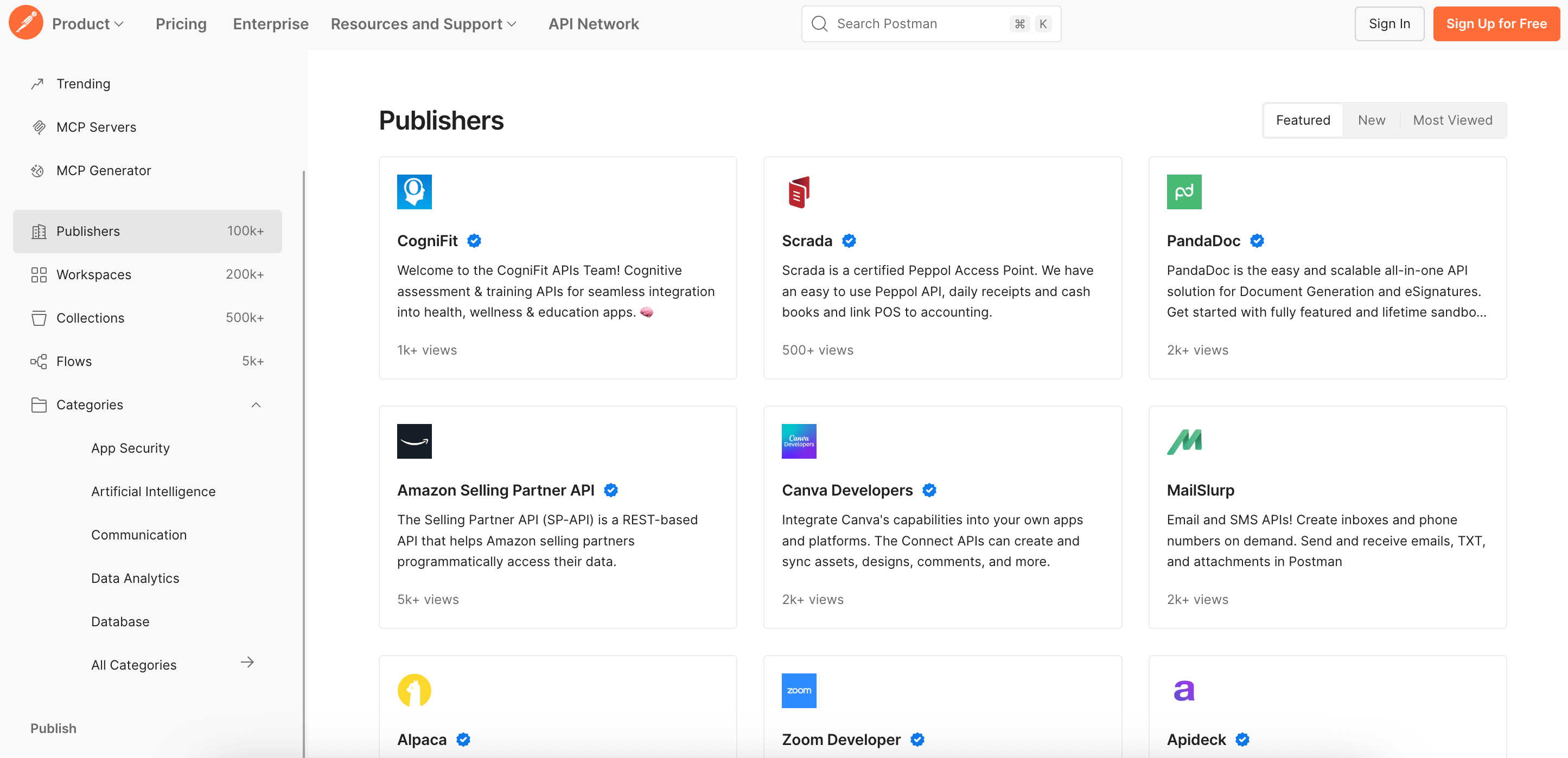
Key features:
- Public API Network with thousands of APIs documented as Postman collections (curated sets of API requests with docs and tests)
- Built-in documentation - API publishers don’t have to deploy documentation outside Postman
- Testing, monitoring, and automation tools included
- Mock servers for simulating APIs during development
- Can import, generate, and work with standard API specification formats (OpenAPI, GraphQL, RAML)
- Extensive collaboration features (workspaces, roles, permissions) - you can edit the same collection of API requests in real time, with changes synced across the team
- CI/CD and automation integrations (GitHub Actions, Jenkins, GitLab)
Limitations:
- No monetization or subscription management - has to be handled by external providers
- Does not host production APIs; providers need external infrastructure
- Suited for testing/discovery, not for publishing revenue-generating APIs
Finding the best home for your API
A good API marketplace puts your API in front of developers who are actively searching for solutions and reduces the friction between building and getting adopted. The best marketplace depends on what you’re building and how you want developers to interact with it:
- Apify enables you to start fast with ready-made solutions on Apify Store, while Apify Console lets you build and deploy custom solutions with full control over logic, deep analytics, and transparent pricing for consumers.
- APILayer is the right match if your API delivers a utility or data service and you want predictable, subscription-based pricing in a curated, domain-focused ecosystem.
- Zyla offers broad categories with stricter quality control, making it a solid choice for developers who want both reach and reliability.
- RapidAPI is the best choice when maximum visibility is the priority, especially if you don’t need hosting or execution infrastructure.
- Postman is ideal when your main goal is discoverability, documentation, and adoption rather than direct monetization.





